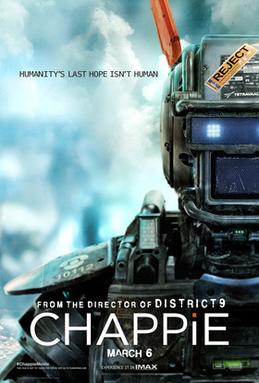In the near
future Johannesburg is the first city ever to have a fully robotised police
force patrolling the streets. It turns out to be an effective move as crime
rates have shot down in South Africa's largest city. Meanwhile, an employee of
the company that provides the robotic police force, Deon Wilson (Dev Petal),
builds a robot that has the ability to mimic human intelligence and have its
own emotions and opinions (for example he could be an art or film critic).
Deon is however hijacked by a group of
thugs (played by the members of the rap group Die Antwoord) and Chappie
(Sharlto Copley) falls into their possession. The thugs wish to use Chappie to
commit a number of crimes to help them pay back the money they owe to a drug
lord. The thugs and Chappie's maker battle for his soul and protect him from
those intent on destroying him.
Chappie's plot synopsis on various websites such as Rotten Tomatoes seems to give one the
idea that Chappie is about a robotic
police state and the citizens of Johannesburg fighting against this authoritarian
police force. It, however, couldn't be further from the truth as Chappie is closer to being Short Circuit than it is RoboCop. Certainly, RoboCop is a massive influence (the ED-209 looks almost identical
to Vincent Moore's, played by Hugh Jackman, prototype police robot), but the
misleading plot synopsis perhaps did Chappie
a disservice as people would go in expecting something more along the lines of RoboCop than Short Circuit. However, for me, Chappie
overcomes the issues of a misleading plot synopsis and shows that the critics
were mistaken in regards to their negative reviews of Chappie.
After the disaster of Elysium (the director, Neill Blomkamp,
admitted the film was a mistake), Blomkamp needed a return to form especially
since his debut picture, District 9,
is regarded in very high esteem. He may have found his form with Chappie and this finding of form is
undoubtedly owed to Chappie himself. Sharlto Copley's motion capture
performance is exceptional, he gives his child like robot very real human
mannerisms and gives the audience a strong emotional connection to Chappie.
Chappie gives the film an emotional backbone that papers off the film's rough
edges as his childlike innocence and naivety makes him an emotionally
investible figure.
What is also greatly moving is
Chappie's recognition of his own mortality (like Rutger Hauer's Roy Batty from Blade Runner) and his relationships with
the human characters, particularly with his adoptive mother (Yolandi Visser)
and his maker. The parental figures, played by members of the rap group Die Antwoord
(who do a surprisingly good job), brings up themes of nature vs. nurture,
discussing how much a child's upbringing can affect who they are as a person in
the future.
As I said the film has some
rather rough edges which are papered over by the emotional connection to
Chappie, namely the script itself could do with some tightening up in regards
to aspects of the central story (for a weapons factory the place is staggeringly
poorly guarded) and Hugh Jackman's villian is so devoid of a rational thought
that he really doesn't work as a threatening and believable villian. The film's
tonal shifts from silly, almost childlike (with swearing), humour to the quite
extreme violence is quite jarring and the overuse of slow motion sequences does
get immensely irritating.
For me Chappie is the Transcendence of 2015, critics have
dismissed it entirely, but I personally liked it and the reason for that is the
fact that Chappie is a hugely investible figure.
3/5




I liked it too, but I hated TRANSCENDENCE. Does that mean we agree or not?
ReplyDeleteI quite liked Transcendence, I feel people were rather harsh on it.
Delete